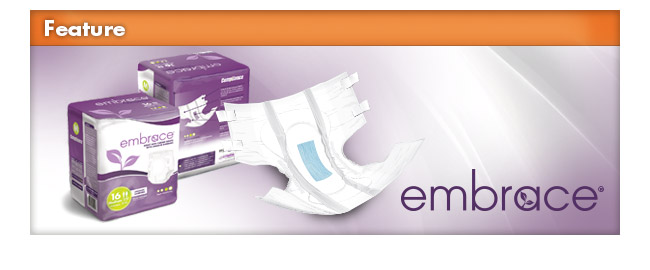 |
 |
| ||||||||||||
| ||||||||||||
| Coming Soon: A Brand-New Brief When ProMed set out to create a new brief, we knew our customers were looking for a product that could provide optimal containment along with comfort and proven absorption. We took your feedback, worked closely with our manufacturing partner and created our exclusive Embrace® Adult Skin Caring Briefs with Leakage Barriers. These briefs have both inner and outer leakage barriers to provide fecal containment along with enhanced comfort. The high-performance dual core rapidly draws in and locks away fluids while super-absorbency polymers control odors and keep delicate skin dry and protected. Additional brief features include:
|
| ProMed Item # | Size | Fits Waist | Packaging | ||||
| 600-SLBM | Medium | 32"-44" | 6 bags of 16 | ||||
| 600-SLBL | Large | 45"-58" | 4 bags of 18 | ||||
| 600-SLBX | X-Large | 58"-64" | 4 bags of 15 |
| In Volume 5, Issue 46, we introduced you to the "change when needed" philosophy, which pairs perfectly with our new Embrace Adult Skin Caring Briefs with Leakage Barriers. Moving forward you will begin seeing "Match Your Product to Your Protocol" icons like the one below in our product materials. These icons are our way of helping you select the products that best align with your facility's protocols. | |||
 |
|||||||
| Your ProMed territory manager has samples of the new brief, which will be in stock in mid-December. To connect with a territory manager, give us a call at (800) 648-5190. | |||
 |
| Study: "Elderspeak" Can Have Negative Effects A new study found that CNAs are more likely to use patronizing "elderspeak" when they are familiar with residents, if the resident has dementia or if no one else is around. The study's authors defined elderspeak as simplified vocabulary or sentence structure, exaggerated intonation and vocal pitch, slowed speech, use of terms of endearment (such as "honey") and collective pronoun usage (such as "we"). The study's authors wrote that "the use of elderspeak may increase resistance to care, threaten self-esteem and well-being, and increase dependency among residents." Rather than relying on elderspeak, the researchers recommended facilities implement training programs designed to improve communication. To learn more, click here. |  |
 |
 |
 |